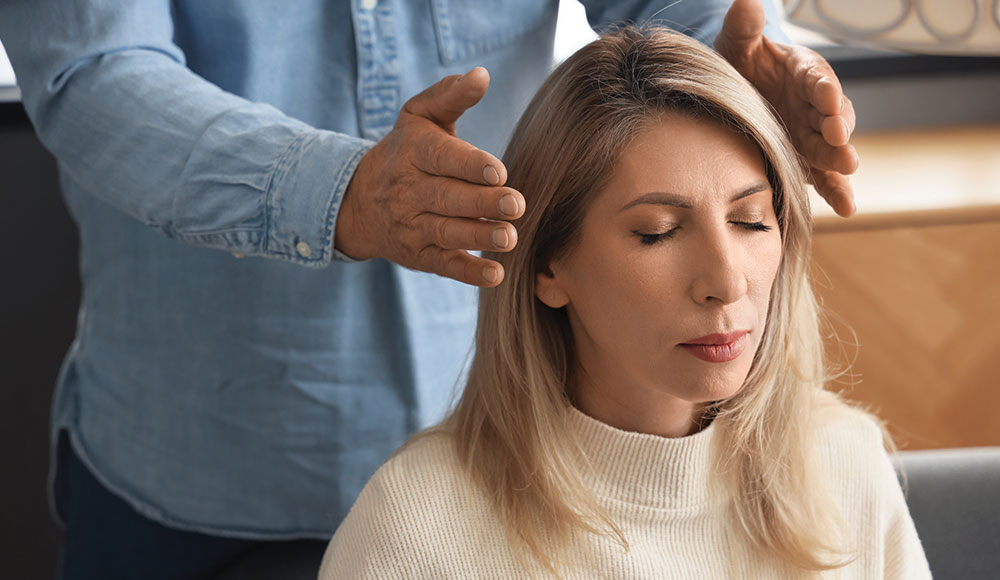Wouldn’t it be great if knowing better actually led to doing better? We’d all be meal-prepping, meditating and sleeping eight hours a night by next week. New Year’s resolutions? One and done—like a vaccine for bad habits.
But after over a decade in the wellness world, I can confirm what you probably already suspect: it doesn’t work that way. Turns out, our brains are creatures of comfort, and they really love chips. From late-night snacking to stress-scrolling, most of our unhealthy behaviors are powered by habit—and habits, unfortunately, don’t care about your vision board.
So should you give up and settle in with a bag of pretzels and a deep dive into all the other people’s business strewn across Nextdoor? Not so fast. Turns out, there is hope—and it probably involves less guilt and more olive oil.
Living in a wellness mecca like Santa Cruz means we’re surrounded by creative, and often effective, ways to reset. One that’s been on my radar again lately may raise an eyebrow or two: hypnotherapy.
I’ll be honest—until recently, I was skeptical myself. I’d attended both individual and group hypnosis sessions in the past and was always the one person who didn’t float into a past life or emerge transformed. I left unsure if I’d missed something or if the placebo effect had just skipped me altogether.
But that changed when I spotted a listing in the Dominican Health wellness calendar for a workshop led by hypnotherapist Stacy Pan. Curious, I searched Psychology Today—known for vetting practitioners based on credentials—and found several local therapists who include hypnosis in their treatment plans.
If your understanding of hypnosis is based on stage shows where people cluck like chickens, it’s easy to write it off. But according to the Society for Clinical and Experimental Hypnosis, it’s “a state of focused attention and receptivity. Hypnosis at first brings on a deeply relaxed and calm state, both physically and psychologically. You will notice such physiological signs as slowed respiration, a low heart rate, warm and dry hands, and relaxed muscles. Psychologically, you may feel calm, peaceful, and may have an empty mind, relatively free of negative or distracting thoughts.”
When I reached out to Stacy Pan, she replied with a slide deck she’d presented at Stanford Medical Center. It included the above definition and supporting research on the physical and psychological benefits of hypnotherapy, along with a short video featuring testimonials from clients who reported relief from pain, anxiety, and success with habit change.
Pan suggests it takes at least three sessions to see progress on an issue, since the rate of healing will vary depending on the nature of the issue and the client’s attachment to it.
To gain further perspective, I contacted Mark Wise of the Santa Cruz Hypnosis Center. With 30 years in healthcare—including roles as therapist, clinical director, and Associate VP of business development at Shands Healthcare, the academic hospital affiliated with the University of Florida—Wise brings strong clinical experience to the field. In 2020, he moved his practice online to continue working with clients during the pandemic. This innovation caught national attention, landing him in The Wall Street Journal in a feature titled “Alexa, Hypnotize Me.” The subtitle read, “Hypnosis, now going virtual, is gaining more acceptance from doctors, researchers and entrepreneurs. But potential patients remain skeptical.”
Following the article, Wise said his office was flooded with calls from across the country—a clear sign that not everyone is skeptical. These days, he’s exploring the integration of AI in therapeutic practice, which he describes as “even more effective than hypnosis.” He adds, “That’s a topic for another column.”
Of course, hypnotherapy isn’t a magic bullet. While most people can be hypnotized to some extent, susceptibility varies. Research shows about 10–15% of people are highly hypnotizable, while a similar percentage find it difficult, if not impossible, to reach a hypnotic state. And no, it’s not about being gullible. Studies out of Stanford show that the brains of highly hypnotizable individuals function differently from those who aren’t.
As for me, I may be among the less-susceptible crowd. But I still love the idea of a simple practice that helps bridge the gap between knowing and doing. If hypnosis works for you, it just might make those “new year, new you” goals a little easier to achieve.
For details on classes, visit stacypan.com and santacruzhypnosiscenter.com.
Dignity Health and Wellness Center classes
Hypnotherapy for Healthy and Sustainable Weight Management
Thursday, 8/20, 5:30-6:30
Hypnotherapy for Stress Anxiety and Sleep
Thursday, 8/17, 5:30-6:30
Hypnotherapy For Medical Users
Thursday 11/15th, 5:30-6:30
Stacy Pan
contact@ StacyPan.com
Cell: 831-471-7971
Mark Wise
(831) 420-7038
ma********@***oo.com
www.santacruzhypnosiscenter.com/










